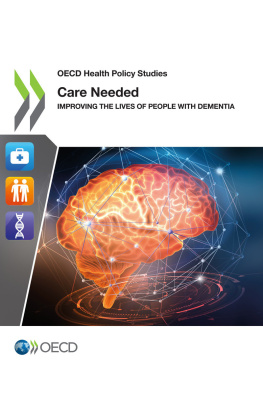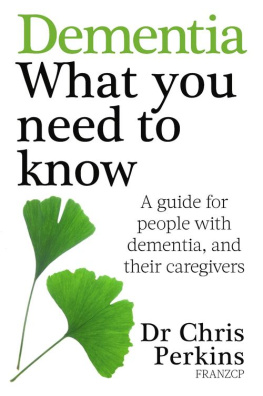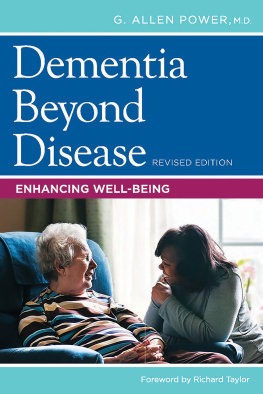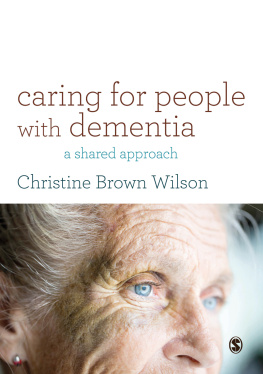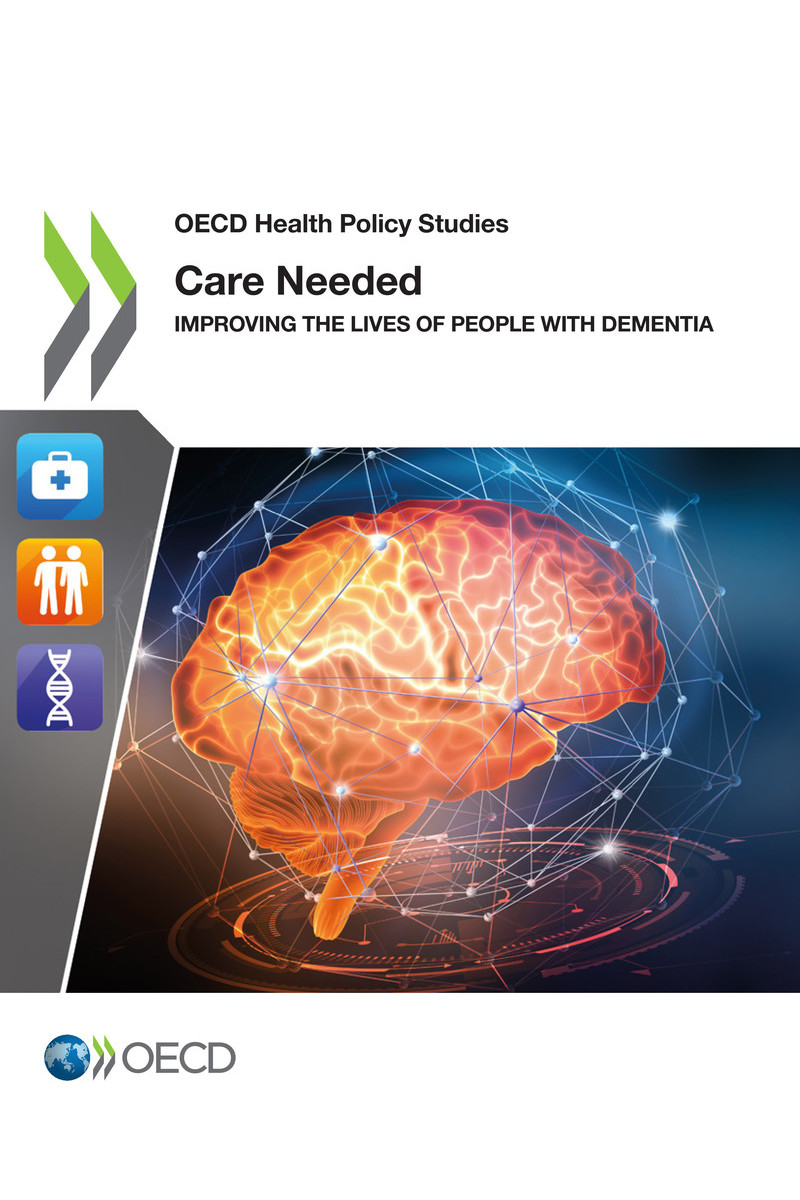OECD Health Policy Studies
Care Needed Improving the Lives of People with Dementia
Please cite this publication as:
OECD (2018), Care Needed: Improving the Lives of People with Dementia , OECD Health Policy Studies, OECD Publishing, Paris.
https://doi.org/10.1787/9789264085107-en
Metadata, Legal and Rights
ISBN: 978-92-64-08509-1 (print) - 978-92-64-08510-7 (pdf) - 978-92-64-30367-6 (HTML) - 978-92-64-30368-3 (epub)
DOI: https://doi.org/10.1787/9789264085107-en
Series: OECD Health Policy Studies
ISSN: 2074-3181 (print) - 2074-319X (online)
This work is published under the responsibility of the Secretary-General of the OECD. The opinions expressed and arguments employed herein do not necessarily reflect the official views of OECD member countries.
This document, as well as any data and any map included herein, are without prejudice to the status of or sovereignty over any territory, to the delimitation of international frontiers and boundaries and to the name of any territory, city or area.
The statistical data for Israel are supplied by and under the responsibility of the relevant Israeli authorities. The use of such data by the OECD is without prejudice to the status of the Golan Heights, East Jerusalem and Israeli settlements in the West Bank under the terms of international law.
Photo credits: Cover Yurchanka Siarhei/Shutterstock and Macrovector/Freepik for the pictos Graphic design by Vif Argent.
Corrigenda to OECD publications may be found on line at: www.oecd.org/publishing/corrigenda .
OECD 2018
You can copy, download or print OECD content for your own use, and you can include excerpts from OECD publications, databases and multimedia products in your own documents, presentations, blogs, websites and teaching materials, provided that suitable acknowledgement of OECD as source and copyright owner is given. All requests for public or commercial use and translation rights should be submitted to .
Foreword
As populations continue to age, the number of people living with dementia in OECD countries is expected to rise from an estimated 19 million today to 40.9 million by 2050. Until a cure for dementia is found, this will have large human and financial implications.
Improving the lives of people living with dementia is both a moral necessity and an economic imperative. Too many people with dementia are not diagnosed, and for those who are, a dementia diagnosis can be devastating. Stigma towards dementia remains too common, and many people are left to manage their condition without adequate access to health and social care services that could help them. The cost for individuals and their families is huge 40-75% of the total dementia care cost. There are high costs for health and care systems from poor quality care, too. Think for example of the large number of hospitalisations of dementia patients that could be avoided through better investment in prevention and care co-ordination. There is growing evidence that prevention to address risk factors for several chronic conditions is also good for preventing dementia. Yet health systems across the OECD only devote less than 3% of health spending to prevention.
In recent years, policy attention towards dementia has grown. At the national level, many OECD countries have focussed efforts on improving the quality of care that people with dementia receive and raising awareness in communities through dementia friends initiatives. Several countries have developed dementia care plans. At the global level, initiatives such as the G8 Summit on Dementia in London (United Kingdom) in 2013 and the creation of the World Dementia Council, among others, are encouraging signs that the global community has taken notice of this pressing issue and is committed to developing innovative solutions to tackle dementia. The OECD has been an active voice in many of these global efforts. The 2015 report Addressing Dementia: The OECD Response already developed a framework for the key objectives of dementia policy.
Yet despite these efforts, we are still failing too many people with dementia. Significant gaps remain in access to and quality of services. Close to 70% of nursing home residents have some form of cognitive impairment, yet staff has often not received training to adequately treat the symptoms of advanced dementia and significant inappropriate use of drugs for behavioural and psychotic symptoms of dementia remains. Data and measurement for dementia are weak and frustrate efforts to monitor progress. Fewer than 40% of countries, for example, are able to estimate their national diagnosis rate.
This report presents an exhaustive look into what OECD countries have done to improve care for dementia across the pathway of the condition. New data collected underscore how far many countries still have to go to ensure that people living with dementia receive high-quality care. In evaluating country progress, this report draws attention to how dementia care continues to be held back by major knowledge and measurement gaps. The findings of this report will help countries further improve how they care for people with dementia today, and set the groundwork for high-quality care in the years to come.
Acknowledgements
This report was prepared by the OECD Health Division. It was coordinated by Tim Atkins (previously with the OECD and currently at the Care Quality Commission, United Kingdom) and Elina Suzuki, and benefited from the expertise and participation of experts within the Health Division as well as country delegates and experts. The report was written by Tim Atkins and Elina Suzuki. Chapter 3 was also co-authored by Ivy Wong, Julie Dunning, Dr. Geoffrey Anderson, Dr. Onil Bhattacharyya, Dr. Samir Sinha, Dara Gordon, Dilzayn Panjwani and Sara Shearkhani, who are all part of BeACCoN (Ontarios Network in Primary and Integrated Health Care Innovations), as well as Ishtar Al-Shammari of the International Consortium for Health Outcomes Measurement (ICHOM) in London, United Kingdom.
The findings of this report were strongly informed by work to pilot dementia quality of care indicators undertaken by the OECD Health Care Quality Indicators (HCQI) Expert Group. The authors would like to thank the country delegates and experts who provided responses to the scoping survey and questionnaire, as well as those who participated in interviews for the report. The report also benefited from the very helpful comments received by delegates from the OECD Health Committee meeting.
The completion of this report was made possible through the generous support of the United Kingdom. We especially thank David Nuttall and Simon Dowlman of the Department of Health, United Kingdom, for their feedback during the drafting of the report. The authors are also deeply grateful to Paola Barbarino, Chris Lynch, Glen Rees and James Smith of Alzheimers Disease International for their very valuable feedback on multiple iterations of the report.
The authors are also grateful to the contributions of the staff from the OECD Health Division. In particular, the authors would like to recognise Ana Llena-Nozal, who leads the work on long-term care, and Emily Hewlett, for their very helpful comments on multiple drafts of the report. Thanks also go to Lucy Hulett, Eileen Rocard and Duniya Dedeyn for their administrative support and help in preparing the manuscript for publication. We are very grateful to Francesca Colombo, Head of the Health Division, for supervising the preparation of this report and providing useful comments on various drafts. Thank you as well to Monika Queisser, Head of the Social Policy Division, for her insightful comments. We also thank Stefano Scarpetta and Mark Pearson, Director and Deputy Director of Employment, Labour and Social Affairs at the OECD for their guidance and extensive comments on various versions of the report.

